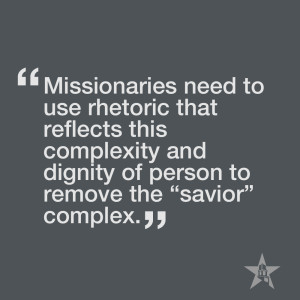Last week, Chad McCallum’s chapel message centered around the claim that the gospel is in dire need around the globe. He lamented that in a world of seven billion people, five billion had yet to hear the gospel. He believes the Church has a great mission on its hands and it needs brave individuals, like you and I, to submit to God’s call and preach the gospel, lest these five billion people perish. McCallum was undoubtedly a compassionate and genuine man, but the underpinnings behind his message were troubling.
 It is difficult for me to write this article out of fear of being seen as anti-missions, anti-Gospel, or God forbid, anti-McCallum. However, that is not my intention at all. I recognize McCallum and missionaries with similar views are God-loving and God-honouring people. However, I find their rhetorical devices paint a view of evangelism and mission that lacks perspective and has troubling ramifications.
It is difficult for me to write this article out of fear of being seen as anti-missions, anti-Gospel, or God forbid, anti-McCallum. However, that is not my intention at all. I recognize McCallum and missionaries with similar views are God-loving and God-honouring people. However, I find their rhetorical devices paint a view of evangelism and mission that lacks perspective and has troubling ramifications.
The gospel is the moving narrative in which God and humanity are reconciled. Are Christians prepared to say that five billion people are out-of-touch with this narrative simply because the organized Christian religion is foreign to them? If the answer is yes, which McCallum’s rhetoric is implying, then humanity has great reason to despair; this would insinuate that the majority of civilizations have been lost due to their geographical location or historical era: a.k.a, due to no fault of their own.
McCallum also finds this fact troubling, hence his challenge to young college students to become young and zealous evangelists. However, this “solution” fails to see the incredibly complex situations in which modern evangelists find themselves. Historically Christian missions has been fueled by pejorative attitudes towards non-western cultures and, at times, been guilty of unethical practices as a means to institute their religion. There is a reason proselytizing is frowned upon, and it is because of the abusive ways evangelism has sometimes taken place. This is a reality the Church must admit too and repent from. Furthermore, Christian missions has also been guilty of perpetuating cultural stereotypes, and lacking nuance when describing their missional communities, thus painting these groups of people either as deeply depraved and unfulfilled persons, or helpless babes in search of a (Christian and hopefully Western) leader. Both these approaches fail to recognize that cultures are made up of good, bad, broken, free-thinking and willing individuals. Missionaries need to use rhetoric that reflects this complexity and dignity of person to remove the “savior” complex.
Furthermore, McCallum’s missional approach hinders one from loving one’s neighbor. We live in a globalized and pluralistic world. It is completely insufficient and rightly insulting for me to be motivated by a potential conversion as a means to tend to my non-Christian friends. You know what I’m talking about. Think about the feeling you get when a Jehovah’s Witness knocks on your door. Exactly. It is for these reasons I find McCallum’s rhetoric to be unsettling and insufficient to meet the needs of our modern world.
 That being said, the challenge still remains. How do we remain thoughtful Christians who believe in the power of the gospel in a postmodern, globalized and pluralistic society? That is no easy answer, and it would be against my intellectual convictions to give you one. But I will end with this: it is a gospel imperative to believe that God is wooing His treasured creation, even if they remain His enemies. Thus, in our current climate, Christians must believe that Jesus bestows grace upon grace on all those who have (or have had) breath.
That being said, the challenge still remains. How do we remain thoughtful Christians who believe in the power of the gospel in a postmodern, globalized and pluralistic society? That is no easy answer, and it would be against my intellectual convictions to give you one. But I will end with this: it is a gospel imperative to believe that God is wooing His treasured creation, even if they remain His enemies. Thus, in our current climate, Christians must believe that Jesus bestows grace upon grace on all those who have (or have had) breath.
Let me embody this concept. My mom often tells me about her friend, Kuldeep, who, as a Sikh, found God to be the greatest comfort before she lost her fight to cancer. What should my reaction be to my mom as she remembers her dear friend? Should I interject and insist this God was Jesus? Or should I remain quiet, embarrassed that my Christian gospel did not have explicit triumph in this context? Neither. I rejoice with my mother, knowing that Kuldeep’s death was indeed filled with grace. Then I praise God, knowing that He touched her, knowing He loves her, knowing that conversion is not a conquest and faith is a journey.
